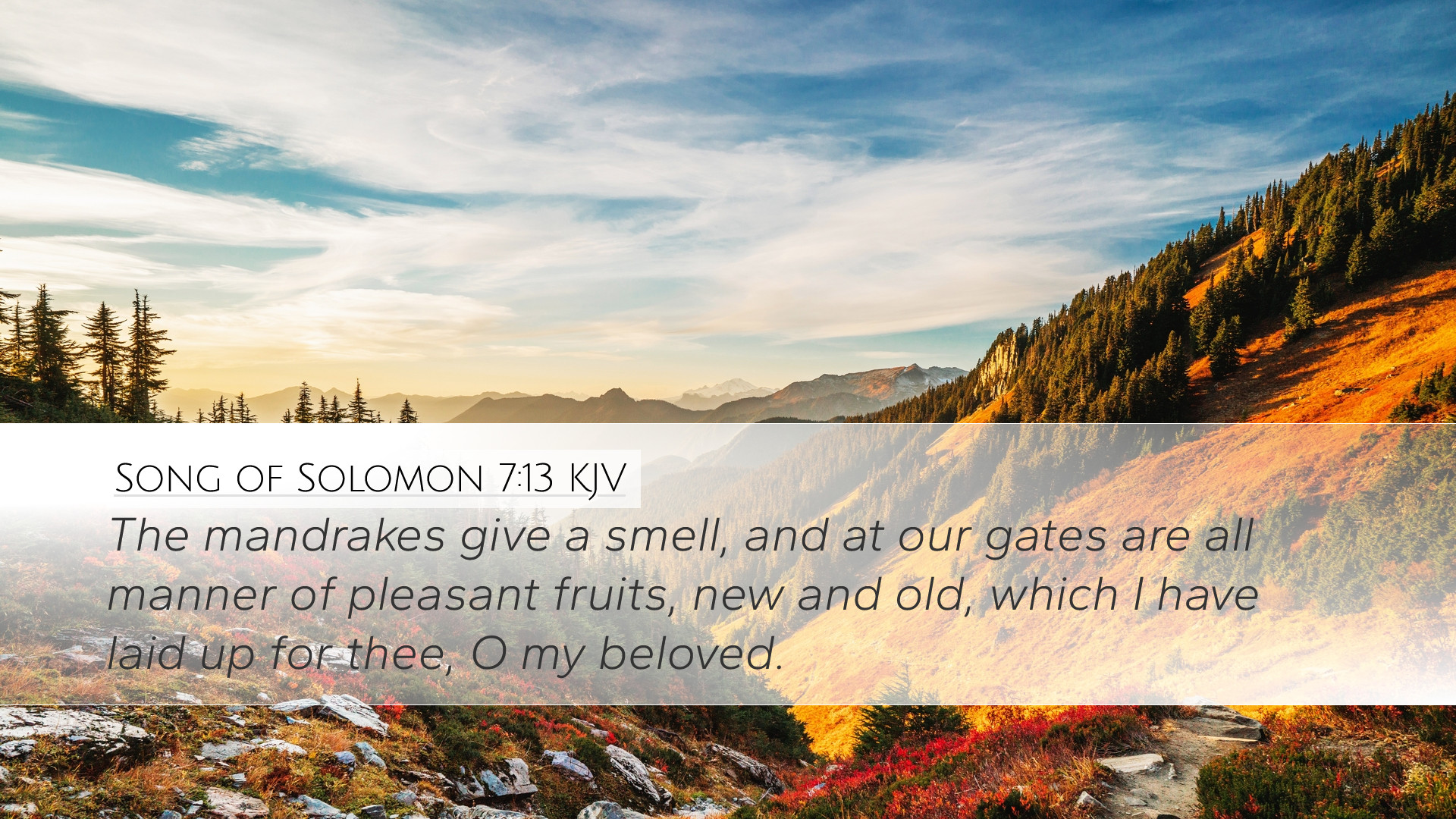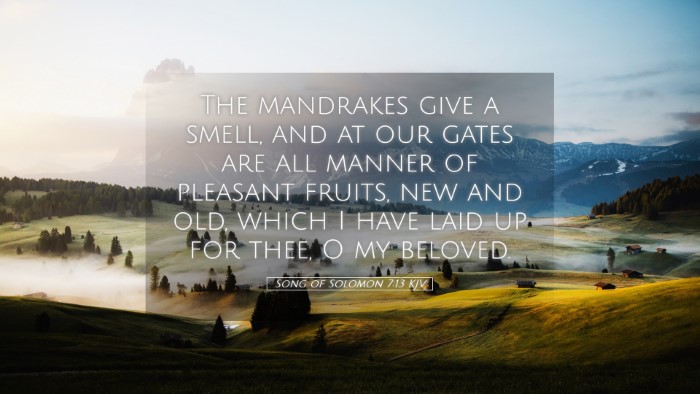Old Testament
Genesis Exodus Leviticus Numbers Deuteronomy Joshua Judges Ruth 1 Samuel 2 Samuel 1 Kings 2 Kings 1 Chronicles 2 Chronicles Ezra Nehemiah Esther Job Psalms Proverbs Ecclesiastes Song of Solomon Isaiah Jeremiah Lamentations Ezekiel Daniel Hosea Joel Amos Obadiah Jonah Micah Nahum Habakkuk Zephaniah Haggai Zechariah MalachiSong of Solomon 7:13
Song of Solomon 7:13 KJV
The mandrakes give a smell, and at our gates are all manner of pleasant fruits, new and old, which I have laid up for thee, O my beloved.
Song of Solomon 7:13 Bible Commentary
Commentary on Song of Solomon 7:13
Verse: "The mandrakes give a smell, and at our gates are all manner of pleasant fruits, new and old, which I have laid up for thee, O my beloved." (Song of Solomon 7:13)
Introduction
The Song of Solomon, often seen as an allegorical narrative of love, articulates themes of desire, beauty, and intimacy. In this verse, the speaker expresses a sense of abundance and joy through the imagery of nature. Mandrakes, often associated with fertility and sensuality, symbolize desire, while the reference to fruitful gates conveys the overflowing blessings of love. This commentary draws insights from the works of Matthew Henry, Albert Barnes, and Adam Clarke to deepen our understanding of this richly layered passage.
Historical and Cultural Context
The mandrake, a plant with a strong, unpleasant odor yet associated with great historical and cultural significance in the ancient Near East, is often linked to the idea of love and fertility. Its roots were traditionally believed to possess aphrodisiac properties, which aligns with the passionate tone of the Song of Solomon. The mention of 'gates' implies a threshold of intimacy, representing a passage to deeper relational experiences.
Matthew Henry's Insights
Matthew Henry notes that the mention of mandrakes signifies the various pleasures and delights that come with love. He emphasizes the sweetness of relationship, akin to the fragrant smell that is evoked in this verse. Henry elaborates on the idea that love enriches life, allowing one to gather the 'pleasant fruits,' symbolizing the manifold blessings that intertwine love and mutual devotion.
Albert Barnes' Perspective
Albert Barnes interprets this passage in the context of the beloved’s abundance—a portrayal of delightful companionship manifesting in both the physical and emotional realms. He suggests that the 'all manner of pleasant fruits, new and old' reflects the variety of experiences that love encompasses. The 'new' fruits symbolize fresh joys and experiences that arise in a relationship, while the 'old' fruits hint at the rich history and memories shared between lovers.
Adam Clarke's Interpretation
Adam Clarke emphasizes the metaphorical richness of this verse. He suggests that the mandrakes and fruits can represent the various joys and blessings that flourish in a relationship founded on love. Clarke argues that the 'gates’ imply a welcoming space where love can thrive, symbolizing an open heart ready to receive and share all that is good in companionship.
Thematic Analysis
This verse encapsulates several key themes in the Song of Solomon: the celebration of love, the beauty of nature, and the richness of relational intimacy.
Celebration of Love
The reference to mandrakes and the fragrant fruits underscores the celebratory nature of love. Both physical attraction and emotional attachment are portrayed as a feast, inviting appreciation and gratitude. The beloved’s offerings of 'new and old' reflect the dynamic nature of romantic relationships, which evolve over time while still cherishing foundational experiences.
Nature as a Reflection of Relationships
The use of botanical imagery suggests that relationships, like nature, require care and cultivation. Just as a garden flourishes with proper attention, love flourishes through mutual respect and admiration. This presents a parallel view where the joys of love are akin to the bountiful harvest of a well-tended field.
Intimacy and Open Doors
The mention of 'gates' signifies not just the threshold of physical entrance but also the vulnerability and openness required in true intimacy. The gate represents the decision to share one's life with another, welcoming them into the inner sanctum of personal joys and burdens. This theme invites reflection on the importance of emotional and spiritual transparency in relationships.
Application for Today
This passage provides profound insights for contemporary readers, especially pastors, theologians, and students of the Bible. It encourages us to view love as a rich tapestry woven from diverse experiences, both joyful and challenging. Here are some practical applications:
- The Power of Symbolism: Recognizing the biblical use of symbols (like mandrakes and fruits) can enhance our understanding of affection and desire in the context of faith.
- Embracing Variety in Love: Just as the verse describes 'new and old' fruits, it invites partners to embrace change and growth while valuing shared history.
- Vulnerability in Relationships: The imagery of open gates reminds us of the need for openness and vulnerability—essential ingredients for fostering deep connections.
- Nurturing Relationships: By drawing similarities between love and gardening, it emphasizes the importance of care and nurture in relationships, suggesting that effort and attentiveness lead to fruitful partnerships.
Conclusion
Song of Solomon 7:13 beautifully articulates the richness of romantic love through its vivid imagery. With insights from notable public domain commentators, we appreciate the intricate dynamics of love—its blessings, challenges, and the importance of nurturing relationships. As both a source of joy and a platform for growth, love remains a central theme in biblical literature, calling readers toward deeper understanding and connection in their own lives.


